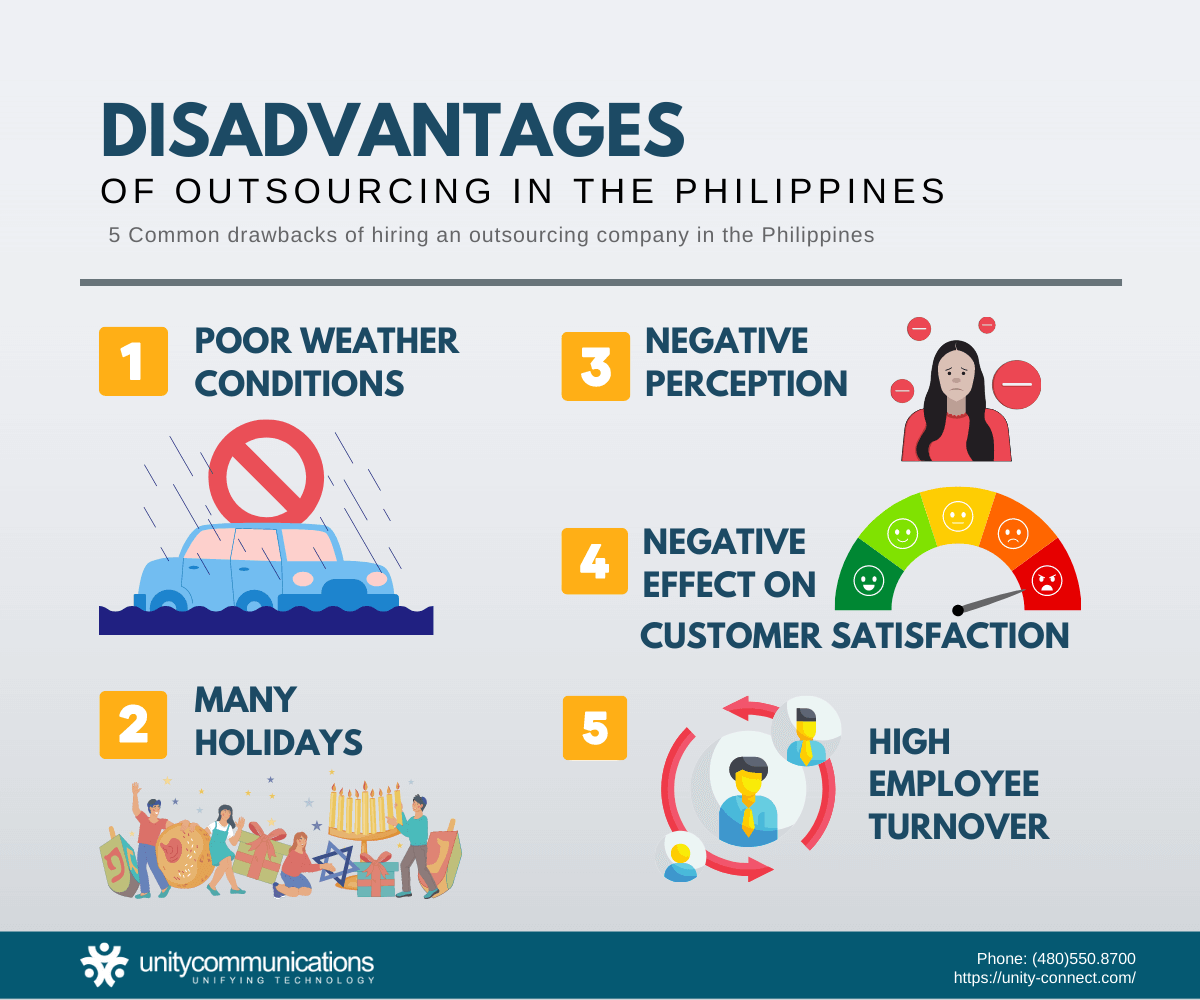Table of Contents
You may know the benefits of offshore outsourcing but not where to begin or what steps to take. Fortunately, numerous options are available for outsourcing destinations, including a plethora of offshoring providers in the Philippines.
This article summarizes the pros and cons of an outsourcing company in the Philippines and compares the country against competitor locations.
Advantages of an Outsourcing Company in the Philippines

For businesses based in the U.S., New Zealand, and Australia, an outsourcing company in the Philippines is top of mind for various offshoring services, whether contact center as a service (CCaaS), information technology (IT), or back-office solutions.
The benefits of outsourcing to the Philippines are plenty. The nation successfully built a robust business process outsourcing (BPO) industry. Below are some advantages of a Philippine BPO company.
1. Large and Young Talent Pool
Local universities in the Philippines produce thousands of highly skilled graduates a year. Many of them are capable of working for your business. This leads to a diverse and expansive talent pool eager to work for reputable companies.
Most Filipino talent has access to high-quality education, equipping them with the skills necessary for BPO services and facilitating their entry into the industry. Additionally, since outsourcing companies in the Philippines receive ample support from the public and private sectors, some graduates prefer starting their careers in the industry.
The country also has a young demographic, with an average age of 25.7. This population grew up with technology. Hence, they have a deeper understanding of how technology benefits businesses.
2. Cost-effective and Good Quality Labor
Most workers in the United States experience a higher cost of living—taxes, healthcare, housing, food, and utilities—than those in the Philippines. An American’s average cost of living is $38,266 per year, and a family of four needs $85,139 annually. In contrast, a Filipino citizen can live comfortably with $512 to $1,790 a year.
The different economic gains and currency movements guarantee that the cost of labor in the Philippines is cheaper than in the United States. The exchange rate between the Philippine peso (PHP) and the U.S. dollar (USD) is PHP 55.05 per $1 (as of April 11, 2023). Thus, BPO clients pay significantly less for offshore talent than onshore contractors.
3. Above Average to Native-speaker English Level
Companies hesitate to offshore primarily because of language barriers. Fortunately, you will not experience these issues with a BPO company in the Philippines.
Most Filipinos are fluent English speakers because English is the primary medium of instruction in the country. Filipinos also rank highly on the EF English Proficiency Index (EPI).
Whether you are outsourcing IT, accounting, or data entry services, collaborating with Filipino contractors is relatively easy. You have proficient communicators who can understand, discuss, and resolve problems better than their counterparts in other BPO destinations.
4. Strong Understanding of Western Culture
Filipino culture was strongly influenced by the West, particularly Spain and the United States, due to their colonization of the Philippines.
Some Americans stayed after the Philippines had achieved independence, and the new nation kept close ties with the U.S. This significantly influenced Filipino culture. Filipinos learned to adopt Western culture, from language and food to religious freedom and education.
That said, Filipino culture is unique and vibrant. American companies recognize and understand it throughout an outsourcing engagement. The cultural parallel between the two nations results in efficient collaboration and easy integration.
5. Strong Government Support for BPO
The Philippine government strongly supports the BPO industry, recognizing it as a major contributor to the country’s gross domestic product (GDP). Lawmakers enacted favorable regulations that make it easier for outsourcing providers to start and sustain operations.
Several agencies are also working to refine industry regulations. In particular, the IT and Business Process Association of the Philippines (IBPAP) aims to innovate the IT and business process management (IT-BPM) sector and strengthen government support.
IBPAP also plans to improve global competitiveness by empowering BPO companies to provide higher-value services. This move will help Filipino workers stay relevant despite automation and artificial intelligence (AI).
The Philippine Council for Industry, Energy, and Emerging Technology Research and Development (PCIEERD) also offers training programs for BPO workers. Online learning solutions such as the Learning English Application for Pinoys (LEAP) equip students with the necessary skills to fulfill BPO demands after graduation.
6. Considerable Tax Benefits
Government institutions, such as the Philippine Economic Zone Authority (PEZA) and the Bureau of Investment, encourage foreign companies to offshore specific functions to the country. These agencies passed the following tax exemptions and incentives for foreign inventors to make the Philippines a more attractive outsourcing destination:
- 50% tax deductions
- Income tax holidays
- Permanent residence for investors and their families
- Import duties exemption
7. Scalable and Flexible Solutions
Although you can hire offshore employees, partnering with an outsourcing company in the Philippines is the safest way to employ talent. The BPO provider is your business partner, helping you create effective, custom solutions. You discuss your specific objectives and goals, and they suggest the best course of action.
Working with a Filipino BPO provider lets you scale your team without additional costs. When outsourcing work to the Philippines, expanding the team based on the type of task and workload your company needs is easier than ever.
8. Guaranteed Data Privacy
The Philippine government ensures that the country’s outsourcing industry thrives by passing favorable laws.
Since back-office outsourcing often involves sharing sensitive information, lawmakers passed the Data Privacy Act of 2012. This law ensures that the country’s data security and confidentiality procedures align with international standards. The law mandates strict data regulation to keep valuable private information from unauthorized access.
The law’s passing leads many industries, such as healthcare, to see the Philippines as a viable outsourcing location.
9. Hardworking Culture and Polite Attitude
Filipino culture centers on families, complementing their hardworking attitude. Filipino workers want to support their loved ones and provide a better life for them, giving them a reason to work harder.
Filipinos are also known to be polite, hospitable, and open, which is particularly vital for customer service or technical support outsourcing roles. More importantly, they are accommodating and professional, taking the extra measure to deliver timely, high-quality work.
10. Reduced Task Management
An outsourcing company in the Philippines offers a remote team that oversees your business functions and manages workers on your behalf. They handle staff attendance, leave reporting, tax headaches, and more.
You can also assign team management or a project lead, all while retaining full control. That way, you can concentrate on your core competencies and only occasionally check in on and review reports regarding the third-party team. Less task management also leads to work-life balance.
11. Fewer Risks and Legal Liabilities
Businesses and top-level executives might encounter lawsuits—most are frivolous by nature—from in-house employees.
When you offshore a function, the legal risk is in the hands of the BPO company in the Philippines. Since you are not directly hiring the staff, handling potential disputes is up to the service provider.
Moreover, outsourcing is a viable strategy to reduce costs, mitigate risk, and optimize operations. The results are lower operating costs, improved flexibility, and less human error.
12. Core Business as the Primary Focus
Building a team in the Philippines lets you offload repetitive and time-consuming tasks to your remote team. Outsourcing non-core activities enables you to concentrate on growing your business. You can spend more time on sales and innovation instead of dealing with non-revenue-generating back-end tasks and their accompanying issues.
Outsourcing improves business focus and lets you strategically direct staff energies. Employees are more efficient when not trapped by daily administrative tasks that downplay their roles, functions, and skills.
13. Access to a Change Catalyst
By outsourcing tech solutions, you get a fresh set of eyes to help you analyze operations and identify areas for improvement. Additionally, offshoring requires you to document and assess workflow to train and empower workers to perform at their best.
You must revisit and improve standard operating procedures (SOPs). This step results in efficiency improvements and greater innovation across your company.
14. Reliable Industry Trusted by Big Companies
Since the first BPO company set up shop in the Philippines, multiple service providers have made the country their base of operations. While Manila was the first office location, they spread out to other big cities such as Cebu, Davao, Bacolod, and Santa Rosa.
Industry giants such as Amazon, Wells Fargo, HP, UnitedHealth Group, and IBM outsource their operations to the Philippines. With these conglomerates’ trust, smaller companies worldwide want Filipino service providers.
Disadvantages of an Outsourcing Company in the Philippines

Every offshore destination has advantages and disadvantages. A business process outsourcing company based in the Philippines also has its drawbacks. When offshoring, consider the overall view.
Below are some disadvantages to be aware of.
1. Poor Weather Conditions
The Philippines is an archipelago with a tropical climate. It rests on the west side of the Pacific Ocean, which explains why it experiences 20 storms on average per year. Cyclones cause power outages and work cancellations in low-lying areas in their paths.
Additionally, the country belongs to the Pacific Ring of Fire, making it more susceptible to volcanic eruptions and earthquakes. The nation encounters almost 100 earthquakes yearly. It also has 53 active volcanoes, although they rarely erupt.
On the bright side, most Filipinos are more than capable of working remotely. Some BPO providers adapted to working from home to maintain business continuity despite natural calamities.
2. Many Holidays
The Philippines currently has 18 official non-working religious and government holidays. Compare this to the 11 official holidays in the U.S. Since the country’s population is predominantly Christian, the government considers many religious and culturally relevant holidays important.
BPO companies can ask staff to report to work; however, the law mandates that they should pay workers more for working on legal holidays. Many Filipino BPO workers are happy to work on holidays due to the additional payment. Hence, you can expect fewer to zero operational disruptions.
3. Negative Perception
There are stereotypes associated with every outsourcing destination. Some foreign companies have had negative experiences with the quality of service of Phillippine BPO companies.
Since they did not partner with a reputable BPO company, they were at greater risk of recruiting less skilled talent. This resulted in the stereotype that Filipinos are incompetent or lazy.
Always partner with a trusted outsourcing company in the Philippines to prevent this from happening. They have more resources and firsthand knowledge to find quality employees. They also have a proper HR team to handle employee retention.
4. Negative Effect on Customer Satisfaction
Even if the offshore team performs as requested, you should put customer demands first. Consider whether customers are happy with the idea of outsourced service.
Satisfied customers are crucial to your success. Here are some instances where Filipino professionals are not the most favorable offshore contractors:
- Customers from rural or regional areas tend to favor locally based services, so Filipino workers are not the best fit to interact with them.
- Filipino contact center agents are less comfortable with cold calling than customer support.
5. High Employee Turnover
This is an issue even for big outsourcing companies in the Philippines. Employee turnover tends to be an overlooked cost in operation, especially in contact centers. A high attrition rate causes several problems for BPO clients, from efficiency to financial issues, not to mention the effect on customer experience if team members have only short tenures.
However, a reliable outsourcing provider takes preventative measures to keep contractors happy and the turnover rate low. For instance, they can show appreciation and offer support to workers. They can also train staff with effective tools, compensate them fairly, and recognize high performers.
To retain workers, BPO companies and their management teams proactively watch for signs of staff disengagement. They can reduce attrition rates by checking on workers’ well-being and ensuring they are satisfied.
BPO Companies: Philippines vs. India
Two major countries come to mind when it comes to outsourcing: the Philippines and India. The former exceeds the latter in terms of English proficiency, voice services, soft skills, and government support. Conversely, India is an ideal destination for software development and other IT solutions.
Here is a breakdown of their differences.
| Philippines | India | |
|---|---|---|
| Beginnings |
|
|
| English Proficiency and Accent |
|
|
| Service Quality |
|
|
| Industry Growth |
|
|
| Infrastructure |
|
|
| Price |
|
|
| Location and Time Zone |
|
|
| Support |
|
|
| Manpower |
|
|
The Bottom Line

The benefits of partnering with a BPO company in the Philippines are access to skilled and English-proficient talent, significant cost savings, improved scalability and flexibility, and less risk of lawsuits. The disadvantages are poor weather, the geopolitical environment, and negative end-customer perception.
Considering all the factors above, a BPO company in the Philippines is a reasonable choice. While other countries offer even lower costs, Western companies find Filipinos’ quality of labor to be higher, providing a better price-to-skill ratio. You can also benefit from the country’s fewer cultural barriers and guaranteed skilled professionals.
When choosing an offshoring provider, consider the location’s pros and cons. Each hub has strengths and weaknesses. Choosing the right BPO provider can be a rewarding move that will fuel your organization’s sustainable growth in the future.




